Hall Moves on I-Move in Kentucky
BY AsphaltPro Staff

I-Move Kentucky is a $180 million investment that will widen and improve interstates, as well as revamp congested interchanges, to improve safety along three busy interstates in Jefferson and Oldham counties: Interstate 64, Interstate 71 and Interstate 265 (Gene Snyder Freeway).
The four-year project will be the largest single construction project in Kentucky since the Ohio River bridges project was completed in 2016. Hall Contracting, Louisville, Kentucky, began work on the project in May 2020.
“I-Move Kentucky will improve safety and mobility on three major interstates that join together in eastern Jefferson County and will allow travelers and freight to move freely through the region,” said Greg Thomas, secretary of the Kentucky Transportation Cabinet (KYTC). “These were among the most important projects identified during last year’s SHIFT prioritization.”
SHIFT, or Strategic Highway Investment Formula for Tomorrow, is KYTC’s data-driven approach to compare capital improvement projects to prioritize transportation funding. The project consists of a number of improvements, including reconfiguring interchanges at I-71/I-265 and I-64/I-265 for better safety and traffic flow. The widening of I-71 adds one 12-foot lane of traffic in each direction, for a total of six lanes between Interstate 265 and KY 329. I-265 will also be widened with an additional 12-foot lane in each direction to create a total of six lanes between KY 155 and I-71.
The widening of I-265 was SHIFT’s number one transportation priority, the I-71/I-265 interchange was ranked sixth, and the widening of I-71 was ranked eleventh. “By tackling [these projects] together, we’re saving Kentucky taxpayers time and money,” Thomas said.
The Design-Build Dash
In 2018, the Kentucky General Assembly passed HB 385, which authorized KYTC to use design-build methods of project delivery for major projects like I-Move. Kentucky has already begun using the design-build approach for two projects in northern Kentucky, including the I-65 bridge project over the Ohio River.
“It seems that KYTC wants design-build to be the new normal on large projects,” said Hall’s Quality Control Manager Jordan Sandquist. “Once one section [of the design] is approved by the state, we can start constructing that section instead of waiting for the whole design all at once.”
Kentucky is also looking into balanced mix design (BMD). Sandquist said both design-build project methods and BMD are indicative of a greater trend within Kentucky’s transportation agencies. “The idea is to give contractors flexibility to meet KYTC’s standards,” Sandquist said. “If you can produce a mix that meets their specs on various tests, how you get there is up to you.”
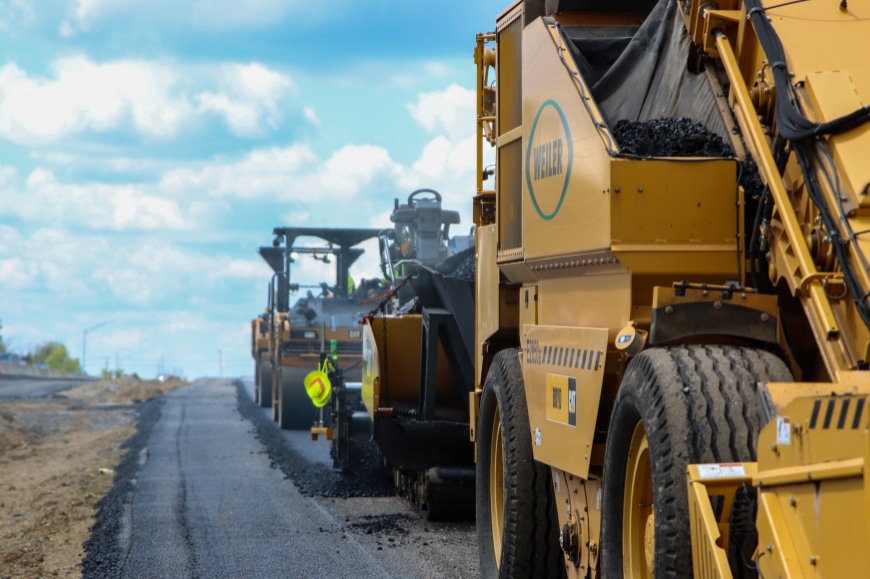
In total, the project will require between 400,000 and 450,000 tons of asphalt.
Roscoe Willis, manager at Hall Paving, a division of Hall Contracting, added, “I think [balanced mix design] is an example of the direction the state is headed in, not only for materials but also for the bid process. It’s results oriented, versus process oriented.”
With the design-build method, Hall will be able to complete the project more quickly. The I-Move project is expected to be broken up into more than 50 buildable units, nine of which are asphalt-related.
Last fall, Hall finished the mill and fill work on I-265, a total of 3 miles or 12 lane miles. In August, the company milled and filled the existing lanes on I-71, a total of 5.5 miles and 22 lane miles. Although I-71 was in pretty bad shape, the construction was more about handling growth and improving safety, said Roscoe Willis, manager at Hall Paving, a division of Hall Contracting.

“This plant gives us a lot of opportunity to add new features down the road,” Willis said. “From injecting additives at the drum to blowing in different products, this plant has the ability to grow with us.”
Hall performed variable depth milling with its Wirtgen mill. The paving crew then placed 3 inches of Class 4 base mix with PG76-22 asphalt cement on the existing lanes.
By the end of the 2021 construction season, Hall anticipates finishing a substantial amount of the asphalt base for the widening of I-71 and all the base for the road widening on 265, completing both the I-71 and I-265 interchanges, and finishing the drainage blanket from Shelbyville Road to Avoca.
The project, totaling 25 contiguous miles, including ramps, is roughly 40 percent asphalt, plus an asphalt drainage blanket beneath the concrete. New lanes along the concrete sections of the pavement will also have an asphalt drainage blanket beneath. The new lanes in the asphalt segments of the project will have a 4-inch drainage blanket, then a 4.5-inch lift Class 4 asphalt base 1.50D with PG64-22, a 3.5-inch lift of Class 4 mix with PG76-22 and 3 inches of Class 4 base mix with PG76-22 to match the existing pavement. The entire span of road will then be topped with 1.5 inches of a Class 4 surface mix.
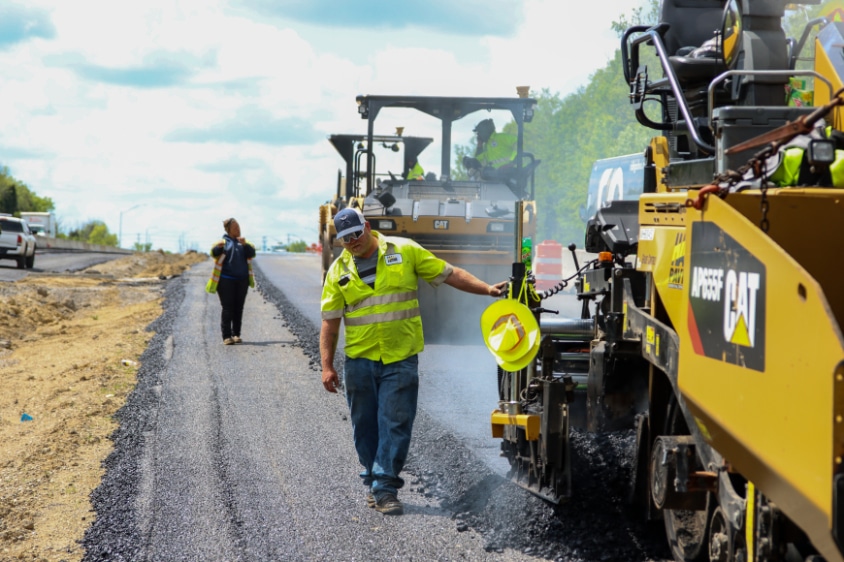
The crew also used the Pave-IR quality control system from MOBA, Limburg, Germany, to record asphalt temperatures immediately behind its Cat paver.
In total, the project will require between 400,000 and 450,000 tons of asphalt. “From an asphalt standpoint, we’re only just getting kicked off,” Sandquist said. Willis estimates they are 20 percent complete.
New Project, New Plant
The I-Move project was a catalyst in Hall’s decision to invest in a new 400 ton-per-hour asphalt plant in Charlestown, Indiana, from ALmix, Fort Wayne, Indiana. They purchased the plant in February 2020 and planned to have it running for last year’s paving season.
“We were close to full capacity at our other plant, so this project put us over the edge,” Willis said. However, the pandemic resulted in planning and zoning delays. “It’s not that they were fighting us on it, but simply that the committees weren’t meeting.” They weren’t able to have the requisite meetings until July 2020, finally getting the new plant fired up in May 2021.
Those delays meant Hall had to rely on its existing asphalt plant south of Louisville, a 400-tph Cedar Rapids plant with three 200-ton silos, for the first segments of the I-Move project. “Since we only had one plant and we couldn’t lose access to it for our daytime projects, we did a lot of night work last year,” Sandquist said.
The new plant currently has two 250-ton silos, but Hall has already laid the foundation for future growth. “This plant gives us a lot of opportunity to add new features down the road,” Willis said. “From injecting additives at the drum to blowing in different products, this plant has the ability to grow with us.”
That was one of several reasons Hall chose the ALmix plant. “ALmix is a great company to be able to add pieces as needed,” Willis said. “We didn’t buy anything we didn’t need, but there are sure to be things we’ll need in the future that we plan to add.”
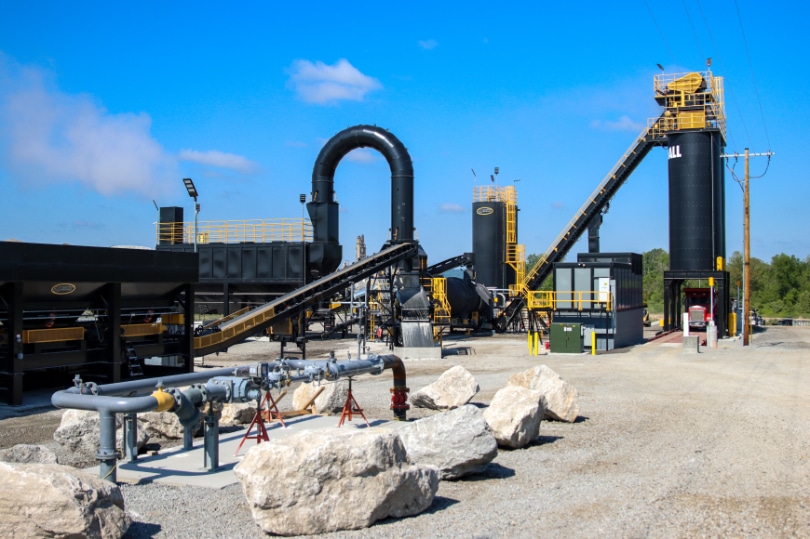
The I-Move project was a catalyst in Hall’s decision to invest in a new 400 ton-per-hour asphalt plant in Charlestown, Indiana, from ALmix, Fort Wayne, Indiana.
Although the company’s Cedar Rapids plant “has been a blessing to us and has held up very well,” its age confines the company to certain limits in terms of innovation, Sandquist said.
“The new one gives us the opportunity to try things we weren’t able to try before,” Willis added.
For example, they’ve been working with aramid fiber for its anti-cracking properties. “We’ve been using it on jobs with the city and showing our customers the advantage of it for asphalt flexibility and strength,” Sandquist said. “Now that Kentucky is moving toward balanced mix design, it will be one more tool we can utilize.”
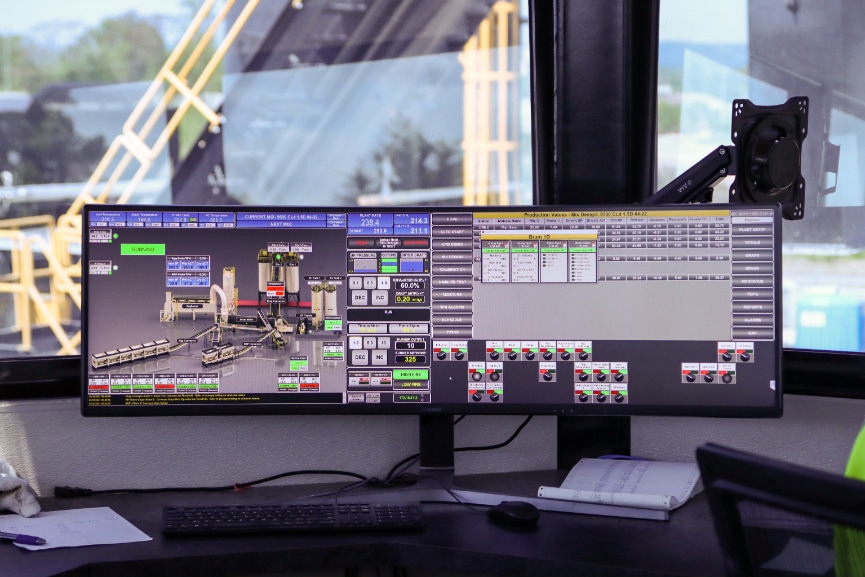
Hall got its new ALmix asphalt plant up and running in May 2021.
New Project, New Technology
In addition to its new plant, the I-Move project has also propelled Hall Paving to invest in several technologies that are new to its crews, including e-ticketing, intelligent compaction, thermal mapping and 3D paving.
“The state is interested in the ability to do forensics if something goes wrong with the pavement in the future,” Willis said. “By accumulating that data, they can go back and analyze it to see temperature and compaction data for problem areas.”
The technology that Willis has found most useful is e-ticketing. “The ability to manage trucks differently, track materials and improve efficiency is very exciting,” he said. They use a tool called Broadloop, which was created locally and allowed them to customize the tool to suit their needs. “The ability to see where our asphalt is in real time is amazing.”
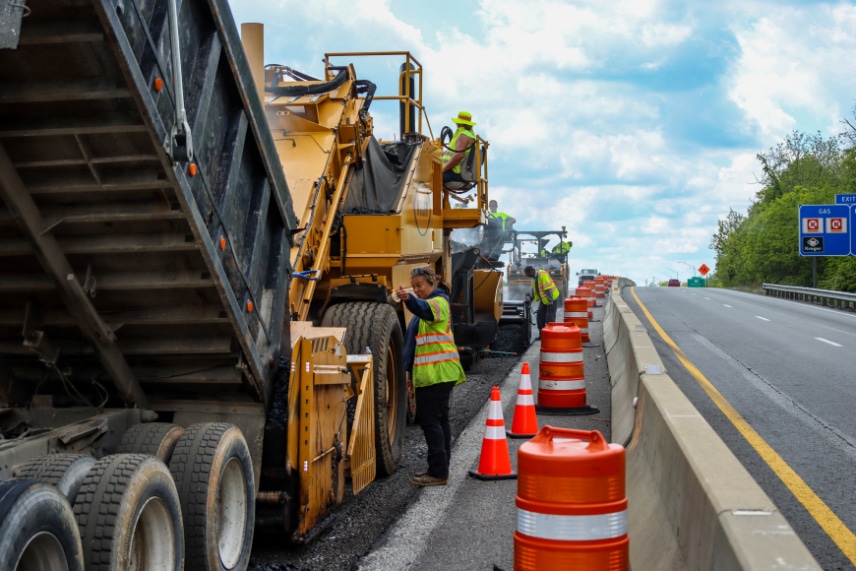
Willis found the use of e-ticketing, a technology new to the company, very useful during the I-Move project. “The ability to manage trucks differently, track materials and improve efficiency is very exciting,” he said.
The crew also used thermal mapping and intelligent compaction on last year’s segments of the project. It used the Pave-IR quality control system from MOBA, Limburg, Germany, to record asphalt temperatures during paving. To ensure the crew was ready to use this technology on its I-Move projects, Hall had its crews trained by the technology provider and also had them use the tech for several weeks prior to the start of the project.
The last new piece of technology on the project is 3D paving, which they will use on future segments of work on I-71, I-265 and I-64 to ensure the final surface elevation of the pavement is correct.
“We’re not afraid to try new things and be on the cutting edge,” Willis said. “This project is propelling us to continue to grow.”
Although Hall Contracting was founded in 1954, its asphalt division wasn’t established until 2013. “On day one, we were starting from square one, and now we’re working on one of the largest projects in Kentucky state history,” Willis said. The division started out with 22 employees and now has a staff of 65. “And we’re looking for more,” he added.

In addition to its new plant, the I-Move project has also propelled Hall Paving to invest in several technologies that are new to its crews, including intelligent compaction.
As an employee-owned company, everyone at Hall Contracting has a feeling of ownership of the company and its projects. “We have the type of team that wants to move the industry forward,” Sandquist said.
Willis added, “We’re really pushing this division of the company to do great things. We’re constantly learning and growing and want to be on the forefront. We want to change the world, one ton of asphalt at a time.”
Logistics in Louisville
According to research platform Macrotrends, the population of Louisville is growing faster than the national average (respectively 0.83 percent and 0.58 percent in 2021). However, it isn’t necessarily population growth that is driving infrastructure demand in and around Louisville.
“Although population growth has something to do with it,” Willis said, “I think it’s mostly a result of improved connectivity with southern Indiana and the growing logistics sector.”
According to the Lane Report, a monthly business magazine covering central Kentucky, Louisville is within a one-day drive of roughly 50 percent of all U.S. markets. Louisville’s website, louisvilleky.gov, states Louisville’s logistics sector is more than twice as dense as the U.S. average.
Furthermore, Louisville is the primary hub of UPS Airlines, a wholly owned subsidiary of United Parcel Service (UPS) and the world’s fourth-busiest air cargo hub in terms of freight volume flown, according to UPS, according to the Lane Report.
